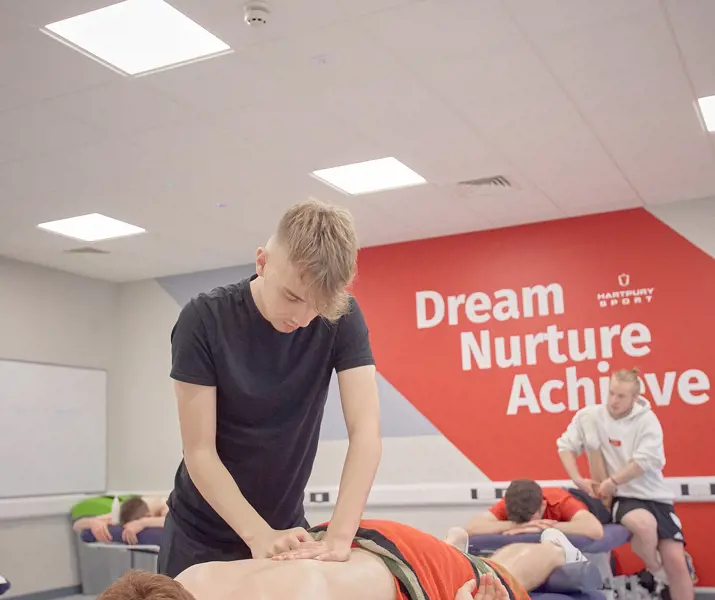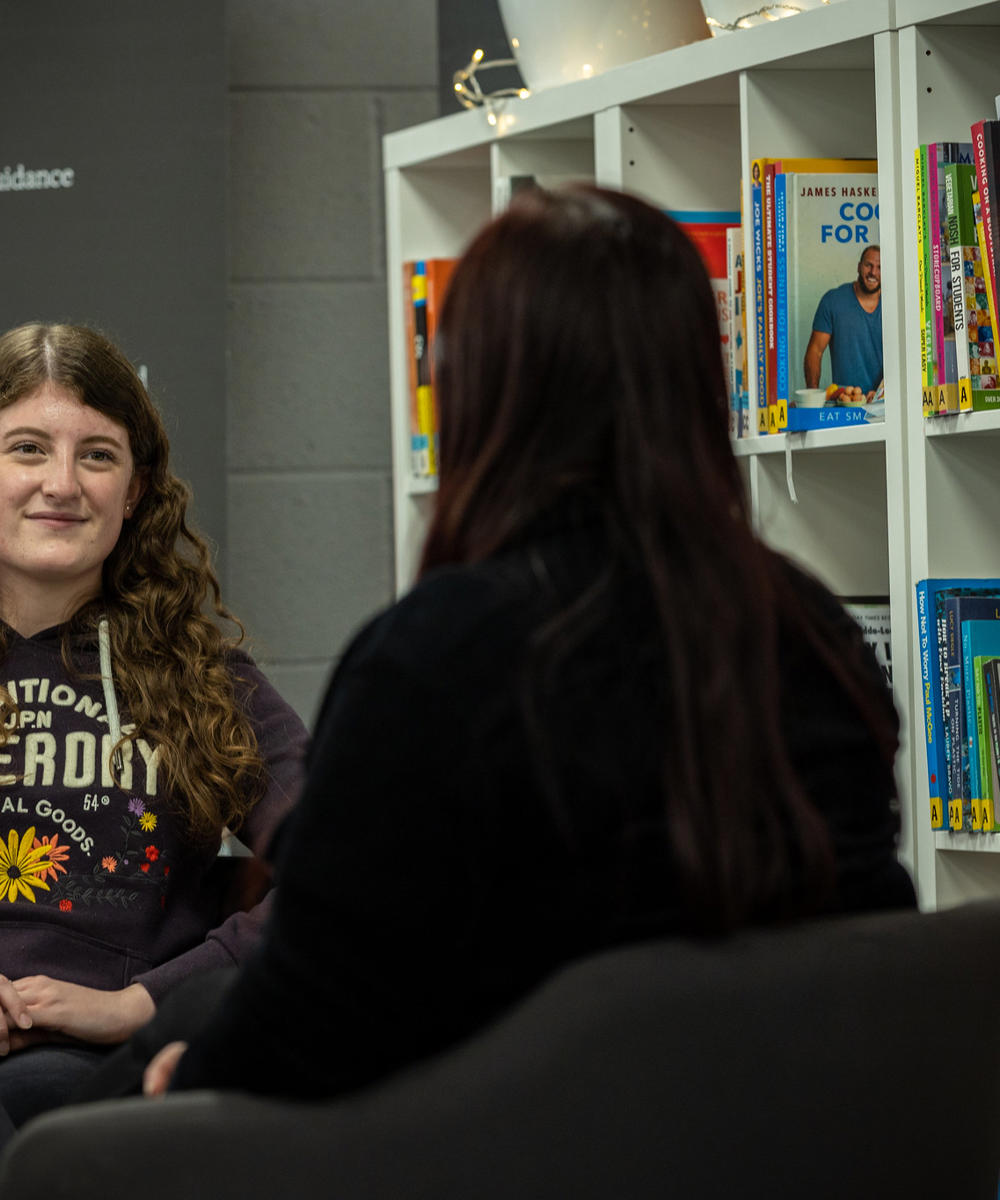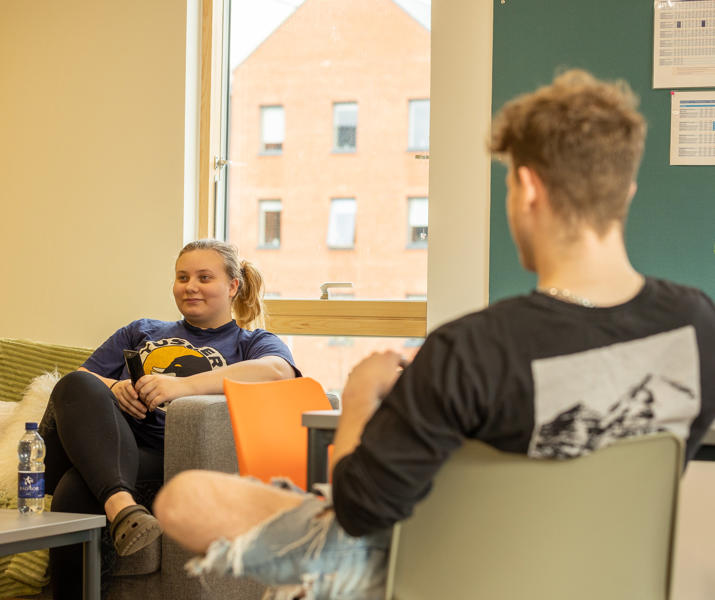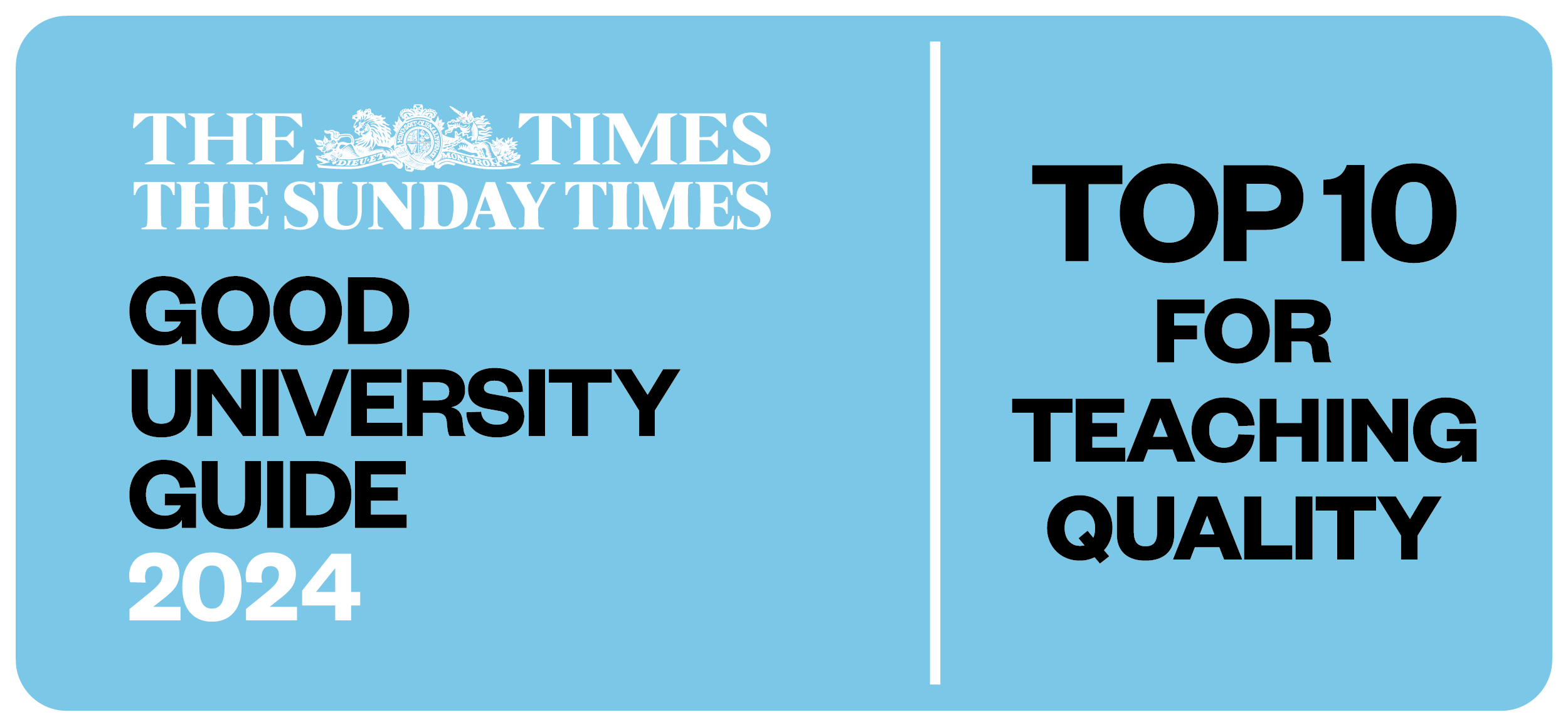The first steps
Starting university is an exciting time for any new student. At Hartpury University, we value the vital role parents, relatives and carers play at all stages of this process.
This page aims to answer any questions you may have about the various steps involved in your family member’s journey and the advantages that come from joining a university.
Improve job prospects
A degree is internationally recognised. In 2020, the national graduate employment rate was 86.4%, compared to 71.3% for non-graduates (GOV.UK, 2021).

Become more independent
Living away from home for the first time can help students develop key life skills including debating, decision making, organisation, research, time management, critical thinking, budgeting, and communication.

Increase earning potential
The median graduate salary of those living in England is an estimated £10,000 more than the median non-graduate salary (GOV.UK, 2021).

Choosing the right course is a decision which shouldn’t be taken lightly, and your family member might need additional help deciding which course and university is right for them.
When thinking about their next steps, your family member could consider:
- Selecting a subject and course
- Do they have a specific course they would like to study, or still deciding?
- Websites such as ‘Prospects’, 'WhatUni' and ‘UCAS’ can help students compare courses directly to one another
- Do they need to study a certain course in order to follow a career path?
- Teaching and assessment methods
- Universities have the ability to teach in a way specific to them and their courses- some may include exams while some may be more practical based
- Module choice
- Have a look online at the course content. Universities usually list the mandatory and optional modules on their websites
- Some universities may not require students to complete a dissertation in their final year
- Location
- Going to university is more than just the course. If you are applying to a university far away from home, you may also have to move away and this means living in a new city or location
- Think about whether you want to live in a city, or if perhaps you would enjoy being more rural – there are universities to suit everyone
- Job prospects
- Does the university and/or course have a good reputation for students progressing onto work? This is known as their employability percentage, and you can find and compare this on ‘University Compare’
- Does the university and/or course have any links with employers that you could benefit from?
- Additional benefits to the course
- Does the course offer a sandwich or placement year?
- What academic support services are available?
- Is there opportunity to join a sports team, join a club or take up a new hobby you’re interested in?
- Visit the university
- The best way to get a feel for a university is to visit it on an open day or campus tour.
- This may also give you the opportunity to talk to the course lecturers and ask any questions you may have.
When selecting a course, your family member may wonder what the difference between a BSc and a BA is, here is the answer:
BA is a Bachelor of Arts – English, humanities and social science are types of BA degree
BSc is a Bachelor of Science – Physics, engineering and computing are types of BSc degree
Both are undergraduate degree programmes and are used internationally.
Usually the main difference is the teaching and assessment style and of these degrees, BA’s often contain more coursework focused assessments. Whereas, BSc degrees often have more practical learning and assessments.
There are also foundation degrees and/or years, these prepare your family member before they start their undergraduate course. Have a look at all the different courses available through UCAS.
Some useful links to help choose the correct course and university for your family member:
Congratulations, your family member has decided to take that step and apply for university. Their first step is to apply via UCAS.
Registering with UCAS
The Universities and College Admissions Service (UCAS) is the central organisation responsible for processing applications for full-time undergraduate study at UK universities.
First, the prospective student will need to register and complete the application using the UCAS online system. This can either be done at home, or with the help of their current school/college. Most careers services at school will help processing UCAS applications.
Applying through UCAS
Prospective students will need to apply for their full-time undergraduate course through the UCAS Undergraduate: Apply and Track. Here, they can find all the details relating to entry requirements and completing the application. When students apply for university, they can apply for a maximum of 5 different courses at different universities. There is also an application fee. The application fee for 2023 is £22 for a single choice, and £26.50 for two or more choices.
Make sure you check the application deadline! This date is 25 January 2023.
When applying, prospective students will need to:
- Complete all their personal details, qualifications and select their course
- Write a personal statement
- Provide a written reference from a teacher or professional who knows them academically
- Pay the UCAS application fee
The points system
While institutions do ask for grades in certain subjects at A-level (or equivalent) as part of their course entry requirements, they may also request a particular amount of UCAS Tariff points. Use the table below to work out what grade your family member will need to achieve in order to meet the tariff point requirements.
|
A-level and Advanced grade |
Tariff points |
BTEC L3 qualification |
Tariff points |
|
A* |
56 |
D* (Distinction *) |
28 |
|
A |
48 |
D (Distinction) |
24 |
|
B |
40 |
M (Merit) |
16 |
|
C |
32 |
P (Pass) |
8 |
|
D |
24 |
|
|
|
E |
16 |
|
|
This means that if you get ABC at A-levels, you will have 120 UCAS points. If your family member has any other qualifications, use the UCAS Tariff Calculator to work out their points. Qualifications, such as the Extended Project Qualification, may also be included in your total and may be included in an offer.
Tracking your application
Once the student has applied through UCAS, they can track their application through UCAS Track. Here, your family member will be able to find out if they received any offers for a place on a course or received an invite to an interview. They can respond to all these through UCAS Track.
Getting an offer
It may take a few months to hear back from the universities about offering your family member a place, so don’t worry, this is normal. The university deadline is 14th July 2023.
There are four possible responses to an application:
- Conditional– your family member will still need to meet the entry requirements, typically their A-level/extended diploma results.
- Unconditional– your family member has been allocated a place on the course, but a few things may still need to be arranged. For example, they may need to get a DBS check, provide proof of their qualifications or meet other medical or financial requirements.
- Unsuccessful- the university has made the decision not to offer your family member a place on their course. Unfortunately, they may or may not be given a reason.
- Withdrawn- either your family member or the university chooses to withdraw a course choice. In these circumstances, your family member should receive an explanation from the university through UCAS Track.
Once all the UCAS offers are in, your family member will need to decide and respond by the deadline. They can:
- Pick a firm choice, your family member’s preferred option
- Select an insurance choice as a back-up, if their firm choice is conditional
- Decline the other offers.
On results day
Your family member will need to log onto UCAS after 8:00 to see if their first-choice university have accepted them. However, not all students get the grades required for their first choice. If this is the case, their second choice may still be an option. In some cases, the first or second choice university may offer your family member a place on a different course to the one they applied for, so they will need to either accept or decline this offer.
Clearing
If neither the first of second choice were accepted by the universities, your family member will have to go through the Clearing process. The clearing process is explained by UCAS in the video below. Clearing opens on Tuesday 5th July 2022 and closes Friday 8th July 2022. Clearing is how universities and colleges fill any places they still have on their courses.
Your family member can use Clearing if:
- they're applying after 30 June
- they didn’t receive any offers (or none they wanted to accept)
- they didn’t meet the conditions of the offers
- they've paid the multiple choice application fee of £26.50
- they've declined their firm place using the ‘decline my place’ button in UCAS Track
Now that your family member has decided they want to attend university and completed their application through UCAS, they may need to apply for student finance to fund their studies.
Student finance differs slightly depending on where in the UK you live. Use the links below to see the student finance process in your country (this is where you live, not where the university is).
- Student finance England
- Student finance Wales
- Student finance Scotland
- Student finance Northern Ireland
Contact the education authority if you live in the Channel Islands (Jersey and Guernsey) or Isle of Man.
Applying for student finance is easier than you think. There are various options available, including tuition fee loans, maintenance loans and non-repayable grants.
Your family member can apply for:
- Tuition Fee Loans - these cover the costs of their course tuition and is paid directly to the university they will be attending.
- Maintenance Loans - these cover your family member’s cost of living while they are at university. They are means tested against your family’s income, so you may be required to provide information about your finances at this stage.
Whether your family member qualifies for student finance depends on:
- Their university or college
- The course they hope to study
- If they’ve studied a higher education course before
- Their age
- Their nationality or residency status
Your family member may be eligible for student finance if their course is in the UK and one of the following:
- A first degree, for example BA, BSc or BEd
- A Foundation Degree
- A Certificate of Higher Education
- A Diploma of Higher Education (DipHE)
- A Higher National Certificate (HNC)
- A Higher National Diploma (HND)
- An Initial Teacher Training course
- An integrated master’s degree
- A pre-registration postgraduate healthcare course
They’ll also be eligible for a maintenance loan if their course is in the UK and one of the following:
- A first degree, for example BA, BSc or BEd
- An Initial Teacher Training course (if it’s degree level or above)
- An integrated master’s degree
- A Foundation Degree in dental hygiene and dental therapy
- A DipHE in dental hygiene and dental therapy or operating department practice
It is also always worth noting that there are bursaries and scholarships that students could be eligible to apply for. Bursaries are non-repayable amounts of money and are means tested against a criterion.
UCAS application – complete
Student finance – complete
Well done! These are the two big steps and you have completed those together.
Next, your family member will need to decide where they want to live while studying their course. Some students choose to move away to attend university, meaning they need to seek out some new accommodation. The main choice here is whether they want to live in student accommodation, a private house/house share or at home with family. Additionally, there is the choice between rural vs city living.
University accommodation
Student accommodation are available to students attending university, although priority is given to first years and international students. The benefit of students living in student accommodation are:
- Making friends – students are able to meet lots of other students studying at the university and form friendships. Chances are, someone in their block will be on the same course.
- Choice – there is lots of choice of accommodation including same-sex halls, catered halls or quiet halls. This will differ from university to university though, and your family members preferred option may not be available at their first choice university.
- Cleaners – some university accommodation come with a cleaner. This means no hoovering or moping in communal areas (cleaners don’t usually clean students’ rooms or do the washing up).
- Forget those bills – many university accommodations include bills such as WiFi, electric and water. This is one less thing to worry about. It is worth noting that universities advise students to get room insurance.
- Safety – student accommodation are usually manned by security and/or wardens, who are on hand to ensure the safety and welfare of students.
For these reasons, university accommodation are usually a popular choice of many first year students. However, it isn’t the only option. Your family member may decide to live in a private rental, or with you or other family.
Living at home
Some students decide that they aren’t ready to move out of their family home, or they see the benefits of living at home while at university. Some reasons why students stay living at home include:
- Saving money – living at home with parents and/or family members is usually a cheaper option than living in university accommodation or private rentals
- Not ready to leave home yet – some students don’t feel ready to leave home and be independent yet – this is totally fine
- Want to focus more on their university studies – living at home usually benefits from less distractions meaning students are able to focus their free time on studying
- Have caring responsibilities – some students may care for someone which means they are tied to the family home
Private rental
Most universities will have an accommodation office on campus. Your family member can go here to find local student letting agents who will find them a suitable private rental for them. Additionally, many students use ‘spare room’ which is a house/flat share service which finds rooms going for rent. For more guidance on how your family member can find a private rental, check out TheUniGuide.
Transport
Whether living in university accommodation, in a private rental or living with you and/or family, something your family member will always need to consider is transport. Students living at home may live further away from the university, meaning the cost of their transport to and from university may be higher than students living in university accommodation, which are usually within walking distance to the main campus.
Students are usually entitled to discounted travel including bus and train passes. The most popular of these are the 16-25 Railcard, which provides students with 30% off train ticket prices when a valid student card is shown. Local bus services such as Stagecoach also offer student bus passes, which can be found here. In London, there is the 18+ student oyster photocard which also awards students 30% off their travel costs.
Websites such as Student Beans, UNiDAYS and Save the Student will also help your family member find the best discounts for their travel needs.
Hartpury accommodation and transport
At Hartpury you can choose to live on-campus surrounded by Gloucestershire’s beautiful countryside or off-campus in the heart of Gloucester City centre.
Whichever option you go for, you’ll get the best of both rural and urban worlds. We’re located just five miles from Gloucester City centre, with buses that come right on to campus.
We give priority booking to first-year undergraduate students who make us their firm choice by the May UCAS deadline, as well as international students.
Getting around at Hartpury is easy. You can hop on one of the public buses that stop regularly on campus. Alongside that, we offer on-campus parking for student cars and have great relationships with local taxi firms.
Your family member has been accepted onto a university course, their student finance and accommodation are all completed, so all that is left to do is pack them up and send them off. But, before you do that, take a look at our helpful checklist.
Checklist:
- Register with the university
- Have they registered with the university and onto their course beforehand? (if necessary). Each university will have a difference process for doing this and your family member should be advised how to do this when they receive their offer paperwork. If you and/or your family member are ever unsure though, contact Student Services at the university.
- Do they have the name of the location and/or person they’re meant to be meeting to register?
- Have they provided all relevant documents (if required)?
- Arrival at halls or private accommodation
- Do they have their accommodation sorted for September?
- Do they have the date for moving into halls or private accommodation?
- Do they need to do anything before moving in? Some universities may ask students to complete specific documentation prior to moving in.
- Have they organised how you are going to get to their new accommodation? Will you require additional help or a moving company?
- Insurance
- It is advisable that students have insurance while at university. Laptop, tablets and phones are expensive to replace and students rely on them to complete their studies. Getting insurance isn’t very expensive but could save your family member in the long run.
- TV License
- If your family member is having a TV at university, by law they need to apply for a TV license. There are fines for not having a TV license when watching live TV and even on demand using their laptop.
- Accessibility
- Does your family member have any accessibility requirements that they should make the university aware of? Universities are required to ensure every student’s needs are met.
- Parking/ Transport
- Will your family member be taking a car to university? If yes, you may need to get a parking permit for university grounds
- If they will be travelling to university via train or bus, is it worth investing in a student pass? For students who use the train, investing in the 18-24 trainline card will save lots on travel costs.
- Registering with the doctors and dentist in the area
- Ensure your family member has registered with a local doctor, the university will often suggest or signpost students to the correct facilities for them
- Registering with a local NHS dentist is also advisable, students are entitled to free dental care.
- Apply for student discounts
- Students are eligible for lots of discounts on clothes, food, travel, tickets and much more. Make sure your family member has signed up to these sites to get the best student discounts
- Some of the best to sign up to are: UNiDAYS; Student Beans; TOTUM (previously NUS card); Save the Student
- Students can also get discounted Amazon Prime for 6 months which may help with buying text books
- It is worth remembering that your family member may not be able to sign up to these sites until they have their university email address.
Choosing the right course and/or university
Choosing the right course is a decision which shouldn’t be taken lightly, and your family member might need additional help deciding which course and university is right for them.
When thinking about their next steps, your family member could consider:
- Selecting a subject and course
- Do they have a specific course they would like to study, or still deciding?
- Websites such as ‘Prospects’, 'WhatUni' and ‘UCAS’ can help students compare courses directly to one another
- Do they need to study a certain course in order to follow a career path?
- Teaching and assessment methods
- Universities have the ability to teach in a way specific to them and their courses- some may include exams while some may be more practical based
- Module choice
- Have a look online at the course content. Universities usually list the mandatory and optional modules on their websites
- Some universities may not require students to complete a dissertation in their final year
- Location
- Going to university is more than just the course. If you are applying to a university far away from home, you may also have to move away and this means living in a new city or location
- Think about whether you want to live in a city, or if perhaps you would enjoy being more rural – there are universities to suit everyone
- Job prospects
- Does the university and/or course have a good reputation for students progressing onto work? This is known as their employability percentage, and you can find and compare this on ‘University Compare’
- Does the university and/or course have any links with employers that you could benefit from?
- Additional benefits to the course
- Does the course offer a sandwich or placement year?
- What academic support services are available?
- Is there opportunity to join a sports team, join a club or take up a new hobby you’re interested in?
- Visit the university
- The best way to get a feel for a university is to visit it on an open day or campus tour.
- This may also give you the opportunity to talk to the course lecturers and ask any questions you may have.
When selecting a course, your family member may wonder what the difference between a BSc and a BA is, here is the answer:
BA is a Bachelor of Arts – English, humanities and social science are types of BA degree
BSc is a Bachelor of Science – Physics, engineering and computing are types of BSc degree
Both are undergraduate degree programmes and are used internationally.
Usually the main difference is the teaching and assessment style and of these degrees, BA’s often contain more coursework focused assessments. Whereas, BSc degrees often have more practical learning and assessments.
There are also foundation degrees and/or years, these prepare your family member before they start their undergraduate course. Have a look at all the different courses available through UCAS.
Some useful links to help choose the correct course and university for your family member:
UCAS application process
Congratulations, your family member has decided to take that step and apply for university. Their first step is to apply via UCAS.
Registering with UCAS
The Universities and College Admissions Service (UCAS) is the central organisation responsible for processing applications for full-time undergraduate study at UK universities.
First, the prospective student will need to register and complete the application using the UCAS online system. This can either be done at home, or with the help of their current school/college. Most careers services at school will help processing UCAS applications.
Applying through UCAS
Prospective students will need to apply for their full-time undergraduate course through the UCAS Undergraduate: Apply and Track. Here, they can find all the details relating to entry requirements and completing the application. When students apply for university, they can apply for a maximum of 5 different courses at different universities. There is also an application fee. The application fee for 2023 is £22 for a single choice, and £26.50 for two or more choices.
Make sure you check the application deadline! This date is 25 January 2023.
When applying, prospective students will need to:
- Complete all their personal details, qualifications and select their course
- Write a personal statement
- Provide a written reference from a teacher or professional who knows them academically
- Pay the UCAS application fee
The points system
While institutions do ask for grades in certain subjects at A-level (or equivalent) as part of their course entry requirements, they may also request a particular amount of UCAS Tariff points. Use the table below to work out what grade your family member will need to achieve in order to meet the tariff point requirements.
|
A-level and Advanced grade |
Tariff points |
BTEC L3 qualification |
Tariff points |
|
A* |
56 |
D* (Distinction *) |
28 |
|
A |
48 |
D (Distinction) |
24 |
|
B |
40 |
M (Merit) |
16 |
|
C |
32 |
P (Pass) |
8 |
|
D |
24 |
|
|
|
E |
16 |
|
|
This means that if you get ABC at A-levels, you will have 120 UCAS points. If your family member has any other qualifications, use the UCAS Tariff Calculator to work out their points. Qualifications, such as the Extended Project Qualification, may also be included in your total and may be included in an offer.
Tracking your application
Once the student has applied through UCAS, they can track their application through UCAS Track. Here, your family member will be able to find out if they received any offers for a place on a course or received an invite to an interview. They can respond to all these through UCAS Track.
Getting an offer
It may take a few months to hear back from the universities about offering your family member a place, so don’t worry, this is normal. The university deadline is 14th July 2023.
There are four possible responses to an application:
- Conditional– your family member will still need to meet the entry requirements, typically their A-level/extended diploma results.
- Unconditional– your family member has been allocated a place on the course, but a few things may still need to be arranged. For example, they may need to get a DBS check, provide proof of their qualifications or meet other medical or financial requirements.
- Unsuccessful- the university has made the decision not to offer your family member a place on their course. Unfortunately, they may or may not be given a reason.
- Withdrawn- either your family member or the university chooses to withdraw a course choice. In these circumstances, your family member should receive an explanation from the university through UCAS Track.
Once all the UCAS offers are in, your family member will need to decide and respond by the deadline. They can:
- Pick a firm choice, your family member’s preferred option
- Select an insurance choice as a back-up, if their firm choice is conditional
- Decline the other offers.
On results day
Your family member will need to log onto UCAS after 8:00 to see if their first-choice university have accepted them. However, not all students get the grades required for their first choice. If this is the case, their second choice may still be an option. In some cases, the first or second choice university may offer your family member a place on a different course to the one they applied for, so they will need to either accept or decline this offer.
Clearing
If neither the first of second choice were accepted by the universities, your family member will have to go through the Clearing process. The clearing process is explained by UCAS in the video below. Clearing opens on Tuesday 5th July 2022 and closes Friday 8th July 2022. Clearing is how universities and colleges fill any places they still have on their courses.
Your family member can use Clearing if:
- they're applying after 30 June
- they didn’t receive any offers (or none they wanted to accept)
- they didn’t meet the conditions of the offers
- they've paid the multiple choice application fee of £26.50
- they've declined their firm place using the ‘decline my place’ button in UCAS Track
Student finance
Now that your family member has decided they want to attend university and completed their application through UCAS, they may need to apply for student finance to fund their studies.
Student finance differs slightly depending on where in the UK you live. Use the links below to see the student finance process in your country (this is where you live, not where the university is).
- Student finance England
- Student finance Wales
- Student finance Scotland
- Student finance Northern Ireland
Contact the education authority if you live in the Channel Islands (Jersey and Guernsey) or Isle of Man.
Applying for student finance is easier than you think. There are various options available, including tuition fee loans, maintenance loans and non-repayable grants.
Your family member can apply for:
- Tuition Fee Loans - these cover the costs of their course tuition and is paid directly to the university they will be attending.
- Maintenance Loans - these cover your family member’s cost of living while they are at university. They are means tested against your family’s income, so you may be required to provide information about your finances at this stage.
Whether your family member qualifies for student finance depends on:
- Their university or college
- The course they hope to study
- If they’ve studied a higher education course before
- Their age
- Their nationality or residency status
Your family member may be eligible for student finance if their course is in the UK and one of the following:
- A first degree, for example BA, BSc or BEd
- A Foundation Degree
- A Certificate of Higher Education
- A Diploma of Higher Education (DipHE)
- A Higher National Certificate (HNC)
- A Higher National Diploma (HND)
- An Initial Teacher Training course
- An integrated master’s degree
- A pre-registration postgraduate healthcare course
They’ll also be eligible for a maintenance loan if their course is in the UK and one of the following:
- A first degree, for example BA, BSc or BEd
- An Initial Teacher Training course (if it’s degree level or above)
- An integrated master’s degree
- A Foundation Degree in dental hygiene and dental therapy
- A DipHE in dental hygiene and dental therapy or operating department practice
It is also always worth noting that there are bursaries and scholarships that students could be eligible to apply for. Bursaries are non-repayable amounts of money and are means tested against a criterion.
Accommodation and travel
UCAS application – complete
Student finance – complete
Well done! These are the two big steps and you have completed those together.
Next, your family member will need to decide where they want to live while studying their course. Some students choose to move away to attend university, meaning they need to seek out some new accommodation. The main choice here is whether they want to live in student accommodation, a private house/house share or at home with family. Additionally, there is the choice between rural vs city living.
University accommodation
Student accommodation are available to students attending university, although priority is given to first years and international students. The benefit of students living in student accommodation are:
- Making friends – students are able to meet lots of other students studying at the university and form friendships. Chances are, someone in their block will be on the same course.
- Choice – there is lots of choice of accommodation including same-sex halls, catered halls or quiet halls. This will differ from university to university though, and your family members preferred option may not be available at their first choice university.
- Cleaners – some university accommodation come with a cleaner. This means no hoovering or moping in communal areas (cleaners don’t usually clean students’ rooms or do the washing up).
- Forget those bills – many university accommodations include bills such as WiFi, electric and water. This is one less thing to worry about. It is worth noting that universities advise students to get room insurance.
- Safety – student accommodation are usually manned by security and/or wardens, who are on hand to ensure the safety and welfare of students.
For these reasons, university accommodation are usually a popular choice of many first year students. However, it isn’t the only option. Your family member may decide to live in a private rental, or with you or other family.
Living at home
Some students decide that they aren’t ready to move out of their family home, or they see the benefits of living at home while at university. Some reasons why students stay living at home include:
- Saving money – living at home with parents and/or family members is usually a cheaper option than living in university accommodation or private rentals
- Not ready to leave home yet – some students don’t feel ready to leave home and be independent yet – this is totally fine
- Want to focus more on their university studies – living at home usually benefits from less distractions meaning students are able to focus their free time on studying
- Have caring responsibilities – some students may care for someone which means they are tied to the family home
Private rental
Most universities will have an accommodation office on campus. Your family member can go here to find local student letting agents who will find them a suitable private rental for them. Additionally, many students use ‘spare room’ which is a house/flat share service which finds rooms going for rent. For more guidance on how your family member can find a private rental, check out TheUniGuide.
Transport
Whether living in university accommodation, in a private rental or living with you and/or family, something your family member will always need to consider is transport. Students living at home may live further away from the university, meaning the cost of their transport to and from university may be higher than students living in university accommodation, which are usually within walking distance to the main campus.
Students are usually entitled to discounted travel including bus and train passes. The most popular of these are the 16-25 Railcard, which provides students with 30% off train ticket prices when a valid student card is shown. Local bus services such as Stagecoach also offer student bus passes, which can be found here. In London, there is the 18+ student oyster photocard which also awards students 30% off their travel costs.
Websites such as Student Beans, UNiDAYS and Save the Student will also help your family member find the best discounts for their travel needs.
Hartpury accommodation and transport
At Hartpury you can choose to live on-campus surrounded by Gloucestershire’s beautiful countryside or off-campus in the heart of Gloucester City centre.
Whichever option you go for, you’ll get the best of both rural and urban worlds. We’re located just five miles from Gloucester City centre, with buses that come right on to campus.
We give priority booking to first-year undergraduate students who make us their firm choice by the May UCAS deadline, as well as international students.
Getting around at Hartpury is easy. You can hop on one of the public buses that stop regularly on campus. Alongside that, we offer on-campus parking for student cars and have great relationships with local taxi firms.
Preparing to leave home
Your family member has been accepted onto a university course, their student finance and accommodation are all completed, so all that is left to do is pack them up and send them off. But, before you do that, take a look at our helpful checklist.
Checklist:
- Register with the university
- Have they registered with the university and onto their course beforehand? (if necessary). Each university will have a difference process for doing this and your family member should be advised how to do this when they receive their offer paperwork. If you and/or your family member are ever unsure though, contact Student Services at the university.
- Do they have the name of the location and/or person they’re meant to be meeting to register?
- Have they provided all relevant documents (if required)?
- Arrival at halls or private accommodation
- Do they have their accommodation sorted for September?
- Do they have the date for moving into halls or private accommodation?
- Do they need to do anything before moving in? Some universities may ask students to complete specific documentation prior to moving in.
- Have they organised how you are going to get to their new accommodation? Will you require additional help or a moving company?
- Insurance
- It is advisable that students have insurance while at university. Laptop, tablets and phones are expensive to replace and students rely on them to complete their studies. Getting insurance isn’t very expensive but could save your family member in the long run.
- TV License
- If your family member is having a TV at university, by law they need to apply for a TV license. There are fines for not having a TV license when watching live TV and even on demand using their laptop.
- Accessibility
- Does your family member have any accessibility requirements that they should make the university aware of? Universities are required to ensure every student’s needs are met.
- Parking/ Transport
- Will your family member be taking a car to university? If yes, you may need to get a parking permit for university grounds
- If they will be travelling to university via train or bus, is it worth investing in a student pass? For students who use the train, investing in the 18-24 trainline card will save lots on travel costs.
- Registering with the doctors and dentist in the area
- Ensure your family member has registered with a local doctor, the university will often suggest or signpost students to the correct facilities for them
- Registering with a local NHS dentist is also advisable, students are entitled to free dental care.
- Apply for student discounts
- Students are eligible for lots of discounts on clothes, food, travel, tickets and much more. Make sure your family member has signed up to these sites to get the best student discounts
- Some of the best to sign up to are: UNiDAYS; Student Beans; TOTUM (previously NUS card); Save the Student
- Students can also get discounted Amazon Prime for 6 months which may help with buying text books
- It is worth remembering that your family member may not be able to sign up to these sites until they have their university email address.
Independent learners at Hartpury University
Hartpury University provides extra support to care experienced and estranged learners who are attending university with us.
At Hartpury, we have a dedicated Independent Learners Network which all students who are care experienced or estranged are entitled to become a part of. The group network is used to promote information that may be useful to Independent Learners, including funding opportunities. There are also the drop-in sessions at the Academic Success Centre, including wellbeing sessions.
Independent learners may need extra support while attending university. For students who have been in care or are estranged, Hartpury University have a special bursary available.
The Care-leavers and Independent Students bursary offers £1,500 to support study for the duration of the programme and is available to full-time students who have been in the care of a local authority for a period of 13 weeks or more or are able to provide evidence of estrangement/financial independence under the age of 25.
Hartpury University has also taken The Stand Alone Pledge, which supports estranged students.








